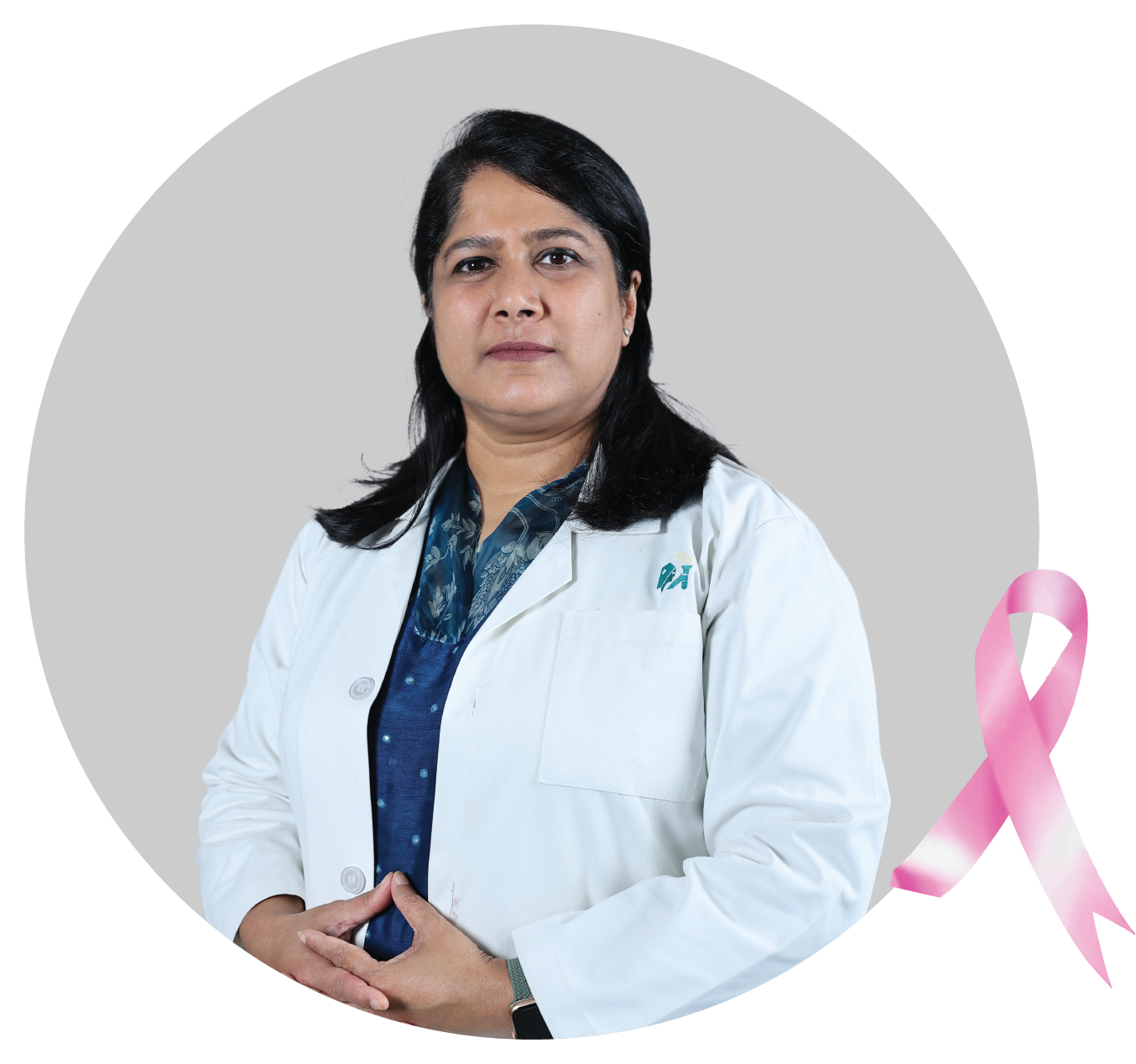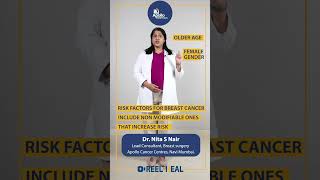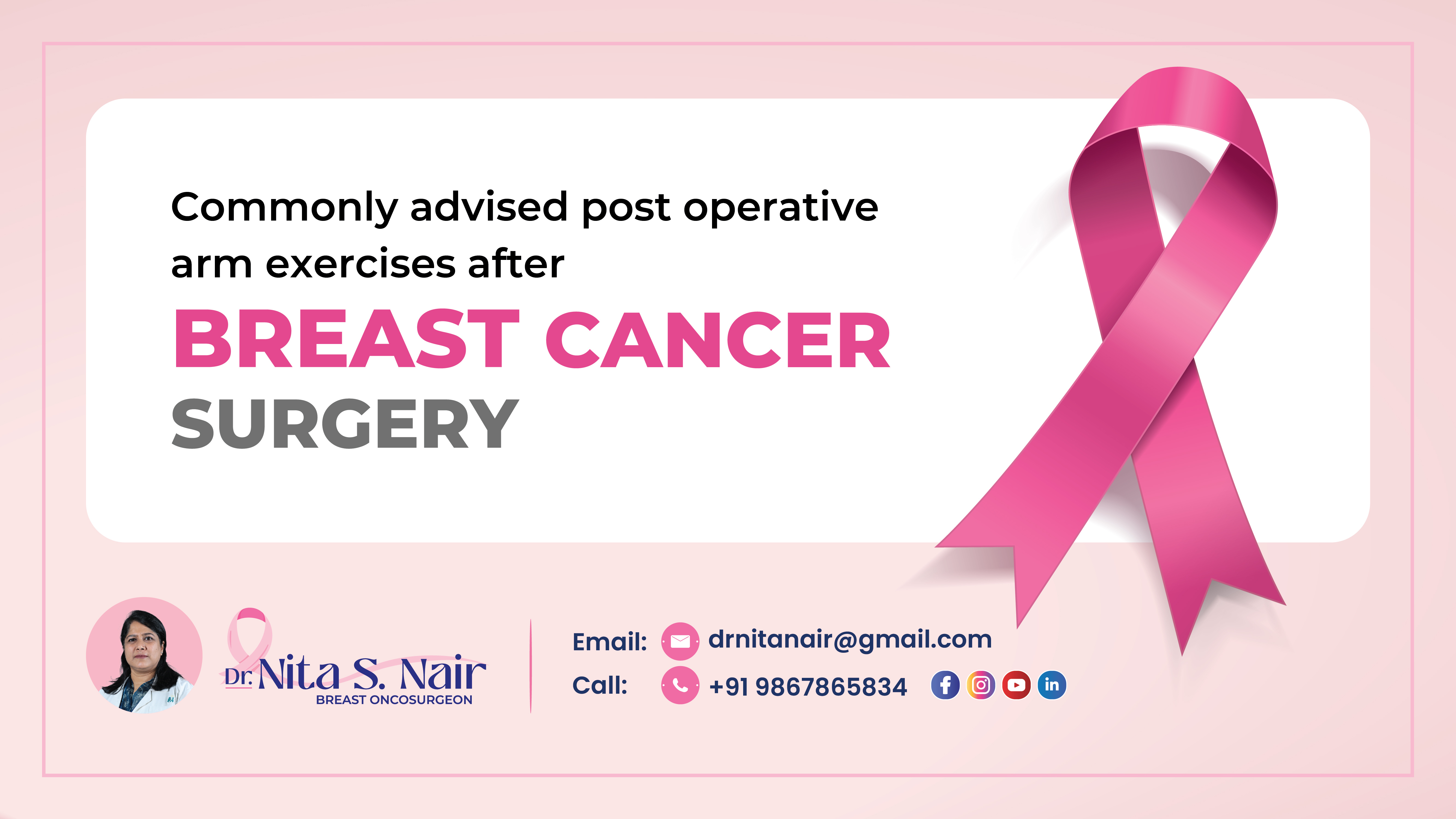The highly trained, knowledgeable, and competent surgeon Dr. Nita Nair specializes in breast cancer surgery. She currently works at Apollo Hospital in Mumbai as a Lead Breast Surgeon.
She graduated from Grant Medical College in Mumbai with an MBBS degree, and she also did a residency in general surgery at P.D. Hinduja Hospital and Medical Research Centre. She also has an M.Ch. in Surgical Oncology from Tata Memorial Hospital in Mumbai and an MRCS(Ed) from the Royal College of Surgeons, Edinburgh and was senior consultant and professor of breast cancer surgery at Tata Memorial hospital for over 12 years
Read More

Breast cancer is a condition that emerges when the cells in the breast develop out of control...

Breast Conserving surgery, also known as breast-conserving therapy or lumpectomy, is a surgical...

The Breast Reconstruction includes both the partial and the whole breast reconstruction...

A chemo port, also known as a port-a-cath or an implanted port,device placed under the skin that allows...



.jpg)
Breast cancer, a malignancy that starts in the breast tissues, usually occurs when the cells in the Breast grow abnormally. These cells can spread by breaking away from the original tumor. This process requires several steps, including cell growth, survival, and migration.
Cell Growth: Healthy cells follow a predetermined path, known as apoptosis or programmed cell death. Cancer cells grow and thrive despite the body's attempt to control or limit their growth.
Survival: Cancer cells continue to live instead of dying off. This can be due to genetic mutations or other changes in the cell that impair the normal process of cell death.
Migration: Often referred to as metastasizing, the cancer cells can break away from the original tumor in the Breast and travel to other areas of the body, usually through the bloodstream or the lymph system.
Understanding breast cancer begins with recognizing its varied forms:
Ductal carcinoma in situ (DCIS): Is a noninvasive condition in which abnormal cells are found in the lining of a breast duct but have not spread outside the duct.
Invasive Ductal Carcinoma (IDC): Cancer spreads from the ducts to other parts of the breast tissue.
Invasive Ductal Carcinoma (IDC): Is cancer that begins in the lobules and has spread to nearby tissues in the Breast.
Male Breast Cancer:Rare in men; this represents any cancer that occurs in the breast tissues of males.
Several risk factors might contribute to the development of breast cancer, including:
Aging: The risk of breast cancer increases as you get older. Dr. Nita Nair, a breast cancer doctor in Mumbai, has a Geriatric Oncology department that ensures the elderly, especially in the face of chronic diseases like breast cancer, are given treatments tailored to their unique needs and conditions
Personal History of Breast Conditions: Non-cancerous breast diseases such as atypical hyperplasia can increase the risk.
Family History: A history of Breast or ovarian cancer in your family may increase your risk, particularly if you have close relatives who developed breast cancer at a young age.
Experiencing Menstruation Early or Late: Beginning Menstruation at an early age or entering menopause at a late age may increase the risk.
Postmenopausal Hormone Therapy: Combined hormone therapy (estrogen and progestin medications) to manage menopausal symptoms can increase the risk.
Certain Inherited Genes: Mutations in genes, such as BRCA1 and BRCA2, will increase the risk of breast cancer.
Being aware of the subtle signals can lead to early detection, which significantly enhances the chances of successful treatment:
Unusual Lumps or Thickening in the Breast or Underarm Area: Any new lumps or thick areas that don't go away should be taken seriously, as they can be early signs of breast cancer.
Change in the Size, Shape, or Appearance of the Breast:Noticeable alterations in how the Breast looks or feels can indicate potential issues that warrant further examination.
Nipple Discharge Other than Breast Milk: Any unexpected discharge from the nipple, particularly if it's bloody or clear, should be checked by a breast cancer doctor in Mumbai as it might suggest a problem.
Skin Swelling or Redness of the Breast: Swelling or redness that makes the breast look or feel different can be a symptom of inflammatory breast cancer and requires immediate attention.
Changes in the Skin over the Breast, such as Dimpling: Skin changes, including dimpling or puckering, can be a sign of cancer and should prompt a consultation with a healthcare professional.
Lump in the Armpit: A lump in the armpit area might indicate that breast cancer has spread to the lymph nodes and should be evaluated as soon as possible.
Mammograms are the most effective method for early detection, and the age and frequency at which they should be carried out are influenced by conversations with your healthcare provider. Dr. Nita Nair, a breast cancer surgeon in Mumbai, spearheads a proficient and compassionate team. As a baseline:
Women aged 40 to 49: are encouraged to discuss with their healthcare provider the optimal time to begin mammogram screenings and the frequency at which they should undergo these tests. This conversation is crucial for determining a personalized screening plan based on individual health needs and risk factors.
Women aged 50 to 74: are advised to undergo a mammogram every two years. Regular screenings in this age group are important for early detection of breast cancer, which can significantly improve treatment outcomes and survival rates.
Women 75 years old and older: should consider continuing their mammogram screenings if they are in overall good health and have a life expectancy of 10 more years or more. Making an informed decision about continuing screening at this age should involve carefully assessing the potential benefits and risks in consultation with their healthcare providers.
Understanding the scope of different screening modalities can offer a more complex yet effective screening approach:
Mammography: Can often detect a problem before physical symptoms emerge.
Clinical Breast Exam: A physical exam of the Breast by a health professional can complement mammography.
Breast Self-Exams: These are conducted monthly to identify changes and prompt discussions with healthcare providers.
Breast MRI: A powerful tool, especially for high-risk women, although it may over-detect some cancers.
Lumps in the Breast are a common concern, and not all are indicative of cancer. However:
Any unusual lump should be evaluated promptly by a healthcare provider.
Remain calm; many breast lumps are benign.
Be prepared for a thorough evaluation, including imaging tests and a possible biopsy, to determine the nature of the lump.
Stay vigilant; regular screenings and self-exams can lead to early detection, which greatly improves outcomes for breast cancer treatment.
Seek support from breast cancer surgeons in Mumbai during the diagnosis and treatment process. Remember, you are not alone in this journey.
Seek support from breast cancer surgeons in Mumbai during the diagnosis and treatment process. Remember, you are not alone in this journey.
Educate yourself about breast cancer and take care of your physical, emotional, and mental well-being during this time. Knowledge is empowering and can help you make informed decisions about your health.
Diagnosis by breast cancer specialists in Mumbai can involve various stages to understand the nature and extent of cancer:
Initial Consultation: This first step involves a comprehensive review of the patient's medical history and a thorough physical examination to identify any visible or palpable abnormalities that may warrant further investigation.
Imaging Tests: Mammograms, ultrasounds, and MRI scans are critical for getting a clearer picture, and they provide detailed visuals of any areas of concern within the breast tissue. These imaging tools are essential in detecting abnormalities that may not be felt during a physical exam.
Biopsy: Should imaging tests reveal areas that raise concern, a biopsy is conducted. This procedure entails the removal of a small tissue sample from the suspicious area, which is then sent to a laboratory for detailed analysis. The biopsy can confirm whether cancer cells are present and, if they are, identify the specific type of cancer.
Staging: Once a cancer diagnosis is confirmed, the next step is staging, which involves a series of tests to determine the extent of the cancer. Staging assesses whether the tumor is confined to the Breast, has invaded nearby structures, or has spread to distant body parts. This process is crucial for designing an effective treatment plan.
Once diagnosed, several treatment strategies exist, and a combination may be necessary:
Surgery: To remove the tumor and surrounding tissue, often followed by reconstructive surgery.
Radiation Therapy: High-powered beams of energy to kill cancer cells.
Chemotherapy: A systemic treatment using drugs to kill cancer cells throughout the body.
Hormone Therapy: Used to treat hormone-receptor-positive breast cancer and lowers the risk of recurrence.
Targeted Therapy: A focus on specific molecules associated with the tumor.
Staging the cancer helps determine the most appropriate treatment approach. The TNM staging system is often used:
Tumor (T): This category provides crucial information about the size and extent of the primary tumor. It helps understand how large the cancer has become and whether it has started to invade adjacent tissues.
Lymph Nodes (N): This indicator reveals whether the cancer has spread to the lymph nodes, vital components of the body's immune system. The presence of cancer in lymph nodes often signifies a higher stage of cancer.
Metastasis (M): This crucial component determines if the cancer has spread to other body parts beyond the original site. Metastasis is a key factor in assessing the severity of cancer and planning the appropriate treatment strategy.
Modifying lifestyle habits can potentially reduce the risk:
Healthy Diet: Eating fruits, vegetables, and whole grains while limiting the intake of processed foods and red meat may reduce the risk.
Regular Physical Activity: Regular exercise, especially postmenopausal breast cancer, can lower the risk.
Limiting Alcohol: The more alcohol consumed, the higher the risk of breast cancer.
Avoiding Tobacco: Smoking is linked to several types of cancer, including breast cancer.
Breastfeeding: Breastfeeding can have long-term protective effects against breast cancer.
Maintaining a Healthy Weight: Being overweight or obese increases the risk of developing breast cancer. Maintaining a healthy weight through diet and exercise can help reduce this risk.
Genetic testing can shed light on potential risks for breast cancer:
BRCA1 and BRCA2: Mutations in these genes can significantly increase the risk.
Other Genes and Genetic Mutations: Ongoing research is identifying additional genetic influences.
Dr. Nita Nair's expertise in precision oncology practices, being a breast cancer specialist in Mumbai, ensures a personalized treatment plan that targets the genetic makeup of a patient's cancer cells, an approach significantly shaping breast cancer treatment.
Breast cancer impacts the body in several profound ways, including:
Physical Health: It can cause significant changes, including the loss of a breast(s) due to surgery, scarring, and changes from treatments like chemotherapy.
Lymphedema: is a common side effect caused by lymph node removal or damage. It is when fluid builds up in the arm or hand, causing swelling.
Fatigue : is a persistent feeling of tiredness that doesn't improve with rest, often due to the body's response to treatments.
Menopausal Symptoms: Treatments may induce early menopause, accompanied by hot flashes, night sweats, and mood changes.
Bone Health: Chemotherapy can weaken bones, increasing the risk of osteoporosis and fractures.
Mental and Emotional Impact: The diagnosis and treatment can lead to anxiety, depression, and body image challenges.
Breast cancer itself may not always cause pain in its early stages. However, as the condition progresses or depending on the treatment undertaken, individuals may experience discomfort or pain due to several factors:
Tumor Growth: Larger tumors pressing against Skin or organs can cause pain.
Surgery: Post-surgical recovery can involve significant pain, managed through medications.
Radiation Therapy can lead to skin irritation and sensitivity, often described as sunburn-like pain. .
Chemotherapy and Other Medications Can cause painful side effects, including nerve damage (neuropathy).
Metastasis: Cancer spreading to bones or other organs can lead to increased pain.
Breast cancer and its treatment can indeed lead to weight gain for several reasons:
Chemotherapy: Some chemotherapy regimens can result in weight gain as they may cause fluid retention or a decrease in metabolism.
Hormone therapy: Treatments aimed at blocking hormones, particularly in breast cancer, can lead to weight gain as they may affect metabolism.
Steroids: Often used to combat inflammation and side effects of chemotherapy, steroids can contribute to increased appetite and weight gain. .
Reduced Physical Activity: Due to fatigue or physical limitations during and after treatment, physical activity may decrease, contributing to weight gain.
Menopause: Treatments that induce menopause can lead to weight gain, as hormonal changes can influence body weight distribution and storage.